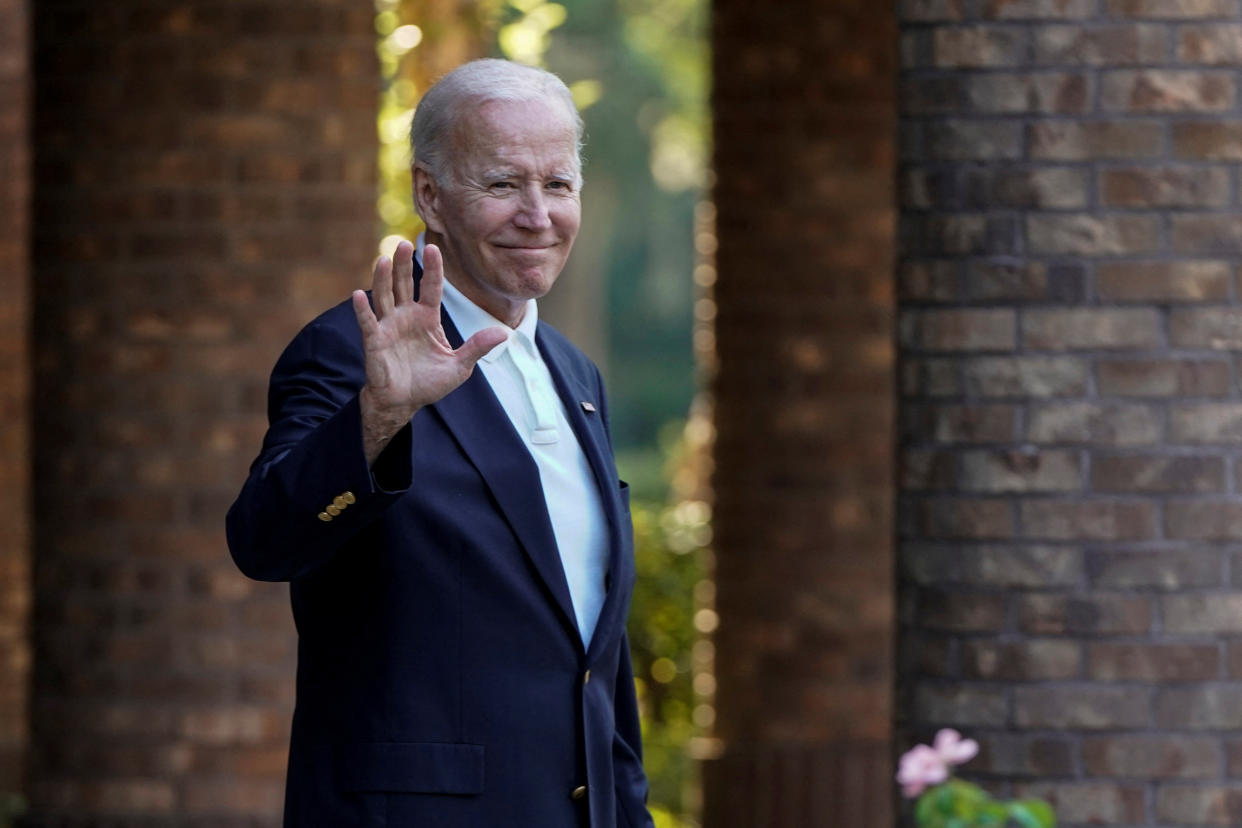Inflation Reduction Act: 4 ways it will kick in right away
The signing Tuesday of the Inflation Reduction Act is set to kick off a parade of action from the Biden administration and other Democrats to sell the bill to the public. While some analysis shows it won't meaningfully reduce inflation, the so-called IRA will devote hundreds of billions of dollars toward fighting climate change, reducing prescription drug costs, and cutting the deficit.
President Joe Biden and others will fan out around the U.S. in the coming weeks to discuss the bill, according to the White House — with Cabinet members traveling to 23 states just this month.
The coming Democratic message will likely focus on the aspects of the bill that could improve Americans' lives immediately — including tax credits for electric vehicles and energy-efficient home improvements and key health care provisions.
“A lot is going to happen,” Biden said recently of what to expect once the bill is signed, trying to emphasize that much of the action will be quick.
"This is a significant piece of legislation that will have both immediate impact and longer term economic impact, as well,” Brian Deese, Biden’s top economic adviser, told Yahoo Finance Live on Tuesday. "The goal of this bill is to do what fiscal policy can do at our current economic moment."

Meanwhile, many experts note that a majority of the bill will be slow-acting.
“Really, this is a 2023, 2024, 2025 game,” Marc Goldwein, a top economist at the Committee for a Responsible Federal Budget, recently told Yahoo Finance. Goldwein, who supports the bill, added, “What this is supposed to do is help stop inflation from persisting over the long term.”
Here are the ways that the bill could be felt by November’s midterm elections — and what will take years.
Tax credits for energy related home improvements
Asked this weekend on CNN what Americans should expect to feel right away, Energy Secretary Jennifer Granholm pointed first to tax credits around energy and Americans' homes.
“Immediately, people will be able to lower the fuel costs in their home,” she said.
She pointed to a new 30% tax credit for installing energy-efficient windows, heat pumps, or newer models of appliances. A second tax credit encourages people to install solar panels on their roofs.
“There are some things that take effect into the future — some that take effect right now,” Granholm acknowledged. But, she added, “A lot of the energy provisions and the energy-efficiency provisions are applicable right now.”
The bill will include $14,000 rebates consumers can use when buying heat pumps or other energy-efficient home appliances. The new appliances would also help families then save on energy bills.
The White House says the 30% tax credit to install solar panels on roofs will make the pricy undergoing more affordable and help save Americans $9,000 on energy bills over the life of the system.
Overall, climate efforts form the centerpiece of the bill — and the Earth won't feel many of those benefits for some years. Still, the combination of provisions in the IRA could reduce greenhouse gas emissions by about 1 gigaton in 2030. That's “10 times more climate impact than any other single piece of legislation ever enacted,” the White House said.
Expanded EV tax credits
Another climate aspect of the IRA are expanded tax credits for electric vehicles. The credits are worth up to $7,500 for new electric vehicles and $4,000 for used electric vehicles that will be available immediately.
“If you install an electric vehicle charging station in your home, you can also get a tax credit,” Granholm says. The change is expected to be good news for many EV makers, but details of the immediate rule changes could lead to some turbulence for EV buyers.
While in some ways the IRA expands the availability of the tax credit, it also has some strict requirements including a mandate that battery components come from the U.S. That has led some in the industry to worry that many vehicles that currently get the credit will now be left out.

Health care changes
Some health care provisions of the bill will also go into effect soon
For Medicare Part D beneficiaries, the bill will limit insulin payments to $35 a month starting in 2023. It will then cap all out-of-pocket drug costs to about $4,000 annually in 2024 and lower that cap further to $2,000 in 2025.
It will directly benefit about 1.4 million beneficiaries each year, according to the White House.
Biden called out these provisions recently as “just one specific example” of the bill's quick impact.
The IRA also averts a major change that would have come had no action been taken. The 2010 Affordable Care Act had included provisions to help certain Americans with a subsidy for their health insurance costs that were scheduled to end this fall. Now they'll be extended for three years at a cost of about $64 billion.
"There's 13 million Americans who, starting this fall, will benefit from lower health care premiums as a result of this bill," Deese added on Tuesday. "Insurers will be sending out out letters in October of this year and because of this legislation people will see lower premiums in those letters."
Still, a major provision allowing Medicare to negotiate for prescription drug prices won’t happen until 2026.
Oil drilling provisions
Finally, changes to oil drilling regulations backed by traditional energy producers will also go into effect right away — though Biden and his aides might not tout these energy-friendly provisions to their Democratic base. These provisions may spur greater oil production, open new areas to drilling, and incentivize “carbon capture” technology.

For his part, Goldwein noted these changes as the one area that may impact inflation in calendar year 2022.
Sen. Joe Manchin (D-WV), a key moderate vote who helped craft the deal, repeatedly touted the energy provisions as fast-acting during a round of television appearances at the end of July.
“We have accelerated permitting, which is what they want, and we have increased production of energy, which is what they want,” Manchin said on CNN, speaking of Republicans, who opposed the bill en masse.
In total, the bill is not expected to have a sizable impact on inflation. The Penn Wharton Budget Model recently predicted that the effort would slightly increase inflation until 2024 and then decrease it afterwards. Other studies have found modest deflation as a result of the bill.
It's not clear whether the IRA will help Democrats during the midterm elections in November, though the president is projecting optimism. Biden recently said he expected it to help Democrats' political fortunes because even the parts that are “not going to kick in for a little bit” will still be “really game-changing for ordinary folks.”
Correction: An earlier version of this story said that the bill would implement the $2,000 price cap for out-of-pocket drug costs for Medicare Part D beneficiaries in 2023. The full cap will actually be phased in and fully implemented in 2025.
Ben Werschkul is a Washington correspondent for Yahoo Finance.
Read the latest financial and business news from Yahoo Finance
Follow Yahoo Finance on Twitter, Facebook, Instagram, Flipboard, LinkedIn, YouTube, and reddit.
